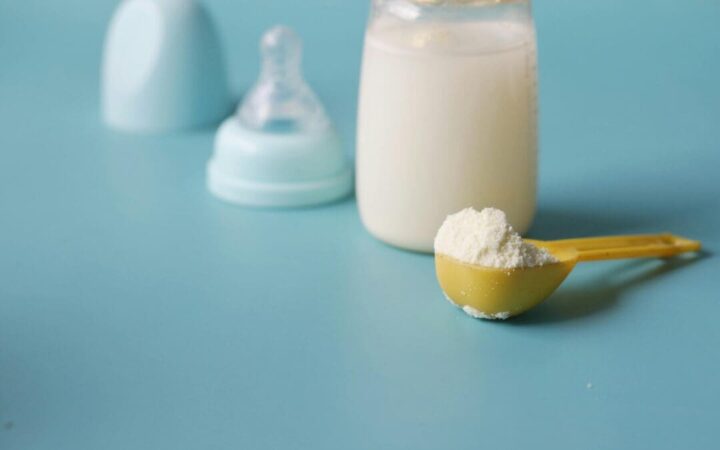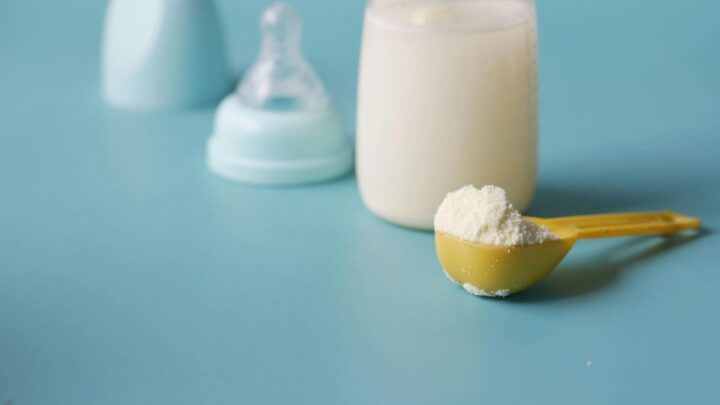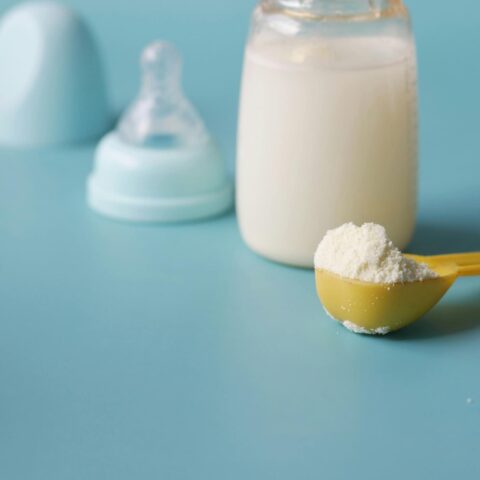Contents
- Understanding Water Types for Infant Formula
- What is Purified Water?
- What is Distilled Water?
- What About Tap Water?
- Evaluating Purified Water for Baby Formula
- Advantages of Purified Water
- Considerations for Mineral Content
- Evaluating Distilled Water for Baby Formula
- Advantages of Distilled Water
- Concerns Regarding Mineral Depletion
- Tap Water: When is it Safe for Baby Formula?
- Boiling Tap Water: A Key Recommendation
- Fluoride Levels and Infant Health
- Checking Local Water Quality Reports
- Expert Recommendations for Baby Formula Water
- American Academy of Pediatrics (AAP) Guidelines
- World Health Organization (WHO) Advice
- Centers for Disease Control and Prevention (CDC) Recommendations
- Preparing Baby Formula Safely with Any Water Type
- Sterilizing Equipment
- Accurate Measurement is Key
- Mixing and Storage Guidelines
- Potential Risks of Incorrect Water Use
- Contamination and Bacterial Exposure
- Mineral Imbalance and Kidney Strain
- Fluoride Over-consumption and Dental Fluorosis
- Frequently Asked Questions About Water for Formula
- Can I use filtered tap water directly?
- Is bottled spring water safe for baby formula?
- How do I know if my well water is safe?
- What if I’m traveling?
- What about “baby water”?
- Conclusion
Deciding whether should I use purified or distilled water for baby formula is a common and crucial question for new parents. The choice of water plays a significant role in an infant’s health and development, impacting everything from nutrient absorption to potential exposure to contaminants. This comprehensive guide, crafted by experienced pediatric experts, delves into the nuances of water types, safety guidelines, and authoritative recommendations to ensure your baby receives the safest and most nourishing start. Understanding the properties of different waters is paramount for safe water for infants and optimal baby formula preparation. We will explore purified water for baby, distilled water for formula, and even the considerations for using tap water.
Understanding Water Types for Infant Formula
The water you mix with baby formula is just as important as the formula itself. Parents often face a bewildering array of options at the grocery store. It’s essential to differentiate between these types and understand their implications for infant health. Each processing method alters the water’s chemical composition, affecting its suitability for delicate infant systems.
What is Purified Water?
Purified water is water that has undergone various processes to remove impurities. These processes typically include reverse osmosis, deionization, distillation, or filtration. The goal is to eliminate chemicals, contaminants, and suspended solids, making the water cleaner. According to the Environmental Protection Agency (EPA) standards, purified water must contain no more than 10 parts per million (ppm) of total dissolved solids (TDS). This rigorous treatment ensures a high level of purity, often making it a preferred choice for many household uses.
What is Distilled Water?
Distilled water is a specific type of purified water that has been boiled into vapor and then condensed back into liquid. This process effectively removes nearly all minerals, salts, and other dissolved solids, including most contaminants and microorganisms. Because distillation removes almost everything, distilled water is often considered the purest form of water available. It is virtually free of minerals, which is a key characteristic when considering its use for infant formula.
What About Tap Water?
Tap water, sourced from municipal supplies or private wells, undergoes treatment to meet safety standards for public consumption. However, its composition can vary significantly by region. Tap water typically contains various minerals, such as calcium, magnesium, and fluoride, which are naturally occurring or added for public health benefits. The presence of fluoride is a particular consideration for infants, as excessive intake can lead to dental fluorosis. Local water quality reports, often available from municipal utility providers, can offer valuable insights into your area’s specific tap water composition and contaminant levels.
Evaluating Purified Water for Baby Formula
Purified water is a popular choice for mixing baby formula due to its reduced contaminant load. This type of water offers several advantages but also requires careful consideration of its mineral content. The processing ensures a cleaner base for formula, which is critical for infant digestive health.
Advantages of Purified Water
One primary advantage of purified water is its enhanced safety profile. The removal of many potential contaminants, such as lead, pesticides, and industrial pollutants, provides peace of mind for parents. Municipal tap water, while generally safe, can sometimes contain trace elements that parents might prefer to avoid in their infant’s formula. Using purified water helps to mitigate these concerns, ensuring a more consistent and cleaner base for each feeding. This consistency is vital for maintaining a baby’s delicate system.
Considerations for Mineral Content
While purified water is cleaner, it typically retains some minerals. The exact mineral content depends on the purification method used. Some parents prefer purified water because they believe the remaining trace minerals are beneficial, assuming they are within safe limits. However, the American Academy of Pediatrics (AAP) suggests that excessive minerals, especially iron or high sodium levels, are not beneficial for infants as formula already contains the necessary nutrients. Parents should check the label of purified water for its mineral profile to ensure it is appropriate for infants.
Evaluating Distilled Water for Baby Formula
Distilled water, with its near-total absence of minerals, presents a different set of considerations for formula preparation. Its purity is unmatched, but this very characteristic raises questions about its suitability for growing infants. The impact of mineral-free water on infant nutrition is a common concern.
Advantages of Distilled Water
The primary advantage of distilled water is its extreme purity. The distillation process removes virtually all dissolved solids, including minerals, chemicals, and most pathogens. This makes it an excellent choice for medical applications and situations where mineral interference is undesirable. For baby formula, it ensures that the water will not introduce any unforeseen contaminants or alter the delicate balance of nutrients provided by the formula itself. This can be particularly reassuring for parents in areas with known water quality issues.
Concerns Regarding Mineral Depletion
A significant concern with distilled water is its lack of minerals. While adult bodies can compensate, an infant’s developing system relies on formula for all its nutritional needs, including trace minerals. If the formula is mixed with water completely devoid of minerals, it could potentially dilute the mineral concentration of the formula. However, leading pediatric organizations, including the AAP, generally state that the minerals in infant formula are sufficient on their own. Therefore, adding water with minimal or no minerals, like distilled water, is usually not problematic as long as the formula is properly prepared.
Tap Water: When is it Safe for Baby Formula?
For many families, tap water is the most convenient and cost-effective option for preparing baby formula. Understanding its safety and when additional steps are necessary is crucial for making informed decisions. Local water quality dictates the suitability of tap water.
Boiling Tap Water: A Key Recommendation
The Centers for Disease Control and Prevention (CDC) and the World Health Organization (WHO) recommend boiling tap water for infants, especially newborns and those with compromised immune systems. Boiling water for one minute effectively kills most bacteria and viruses that could be present. After boiling, allow the water to cool to room temperature before mixing with formula. This sterilization step is particularly important in emergencies, during travel, or if your local water supply is of uncertain quality. Once cooled, store the boiled water in a clean, covered container for up to 24 hours.
Fluoride Levels and Infant Health
One of the most debated aspects of using tap water for formula is its fluoride content. Fluoride is essential for dental health, but excessive intake in infants can lead to dental fluorosis, a condition causing white streaks or spots on developing teeth. According to the American Dental Association, consistently mixing formula with fluoridated tap water (above 0.7 mg/L) may increase the risk of fluorosis. Parents concerned about fluoride can alternate between fluoridated tap water and low-fluoride purified or distilled water. Consulting with your pediatrician about local water fluoride levels is highly recommended.
Checking Local Water Quality Reports
Accessing your local water quality report (Consumer Confidence Report) is a vital step in determining tap water suitability. These reports, provided annually by your municipal water utility, detail contaminant levels, treatment methods, and overall water quality. They often list levels of lead, nitrates, bacteria, and other substances. If your home has well water, it should be tested regularly for contaminants, especially nitrates, which can be particularly harmful to infants. The EPA provides resources to help locate these reports.
Expert Recommendations for Baby Formula Water
Authoritative health organizations provide clear guidance on water for infant formula. Following these recommendations ensures the safest practices for your baby’s health. These guidelines unify best practices from extensive research.
American Academy of Pediatrics (AAP) Guidelines
The AAP advises that for most healthy full-term infants, tap water can be used for formula preparation. If you are concerned about your water quality or have a well, boiling the water for one minute and allowing it to cool is recommended. For fluoride, the AAP suggests that parents consult their pediatrician if their water supply has high fluoride levels. They generally support purified or distilled water as safe alternatives, emphasizing that the primary nutritional content comes from the formula itself. The focus remains on proper formula preparation to avoid contamination.
World Health Organization (WHO) Advice
The WHO emphasizes the importance of safe water for infant feeding globally. Their guidelines strongly recommend boiling water, especially in regions where water quality is uncertain or unreliable. For formula preparation, the WHO recommends bringing fresh tap water to a rolling boil for one minute, then letting it cool to no less than 70°C (158°F) before mixing with formula. This temperature is hot enough to kill harmful bacteria that might be in the formula powder itself. They also highlight the need for clean preparation surfaces and utensils.
Centers for Disease Control and Prevention (CDC) Recommendations
The CDC echoes the advice of boiling water for one minute, particularly for infants under two months old, premature babies, or those with weakened immune systems. They also advise against using water that is excessively soft or has undergone water softening treatments, as these can increase sodium levels. If you’re using well water, the CDC stresses the importance of regular testing to ensure it’s free from harmful bacteria or nitrates. Their primary concern is preventing waterborne illnesses and ensuring appropriate nutrient delivery.
Preparing Baby Formula Safely with Any Water Type
Regardless of the water type you choose, proper formula preparation techniques are paramount to your baby’s health. Contamination and incorrect mixing can lead to serious health issues. Adhering to strict hygiene and measurement guidelines is non-negotiable.
Sterilizing Equipment
Before preparing formula, always wash your hands thoroughly with soap and water. Ensure all bottles, nipples, rings, and caps are sterilized. This can be done by boiling them in water for five minutes, using a steam sterilizer, or through a dishwasher’s sanitizing cycle. This step eliminates harmful bacteria that could contaminate the formula. Sterilization is especially important for newborns and infants with delicate immune systems.
Accurate Measurement is Key
Always follow the manufacturer’s instructions on the formula package for water-to-powder ratios. Using too much water can dilute the nutrients, leading to poor weight gain and nutrient deficiencies. Using too little water can result in an overly concentrated formula, potentially causing dehydration or kidney issues for the baby. Precision in measurement is critical for ensuring your baby receives the correct balance of nutrients and hydration. Use only the scoop provided with the formula.
Mixing and Storage Guidelines
Mix the formula thoroughly until all powder is dissolved. Never shake the bottle vigorously, as this can introduce air bubbles which may cause gas for the baby. Instead, gently swirl the bottle. Prepared formula should be used immediately or stored in the refrigerator for no longer than 24 hours. Discard any formula left in the bottle after a feeding, as bacterial contamination can occur rapidly from the baby’s saliva. Never warm formula in a microwave, as it can create hot spots that burn a baby’s mouth. Warm bottles by placing them in a bowl of warm water.
Potential Risks of Incorrect Water Use
Using the wrong type of water or improper preparation can introduce various health risks for infants. Awareness of these dangers helps parents make informed choices. The consequences range from mild digestive upset to severe health complications.
Contamination and Bacterial Exposure
Unboiled tap water or inadequately treated well water can harbor bacteria, viruses, or parasites that are harmless to adults but dangerous for infants. Such contamination can lead to severe gastrointestinal infections, vomiting, diarrhea, and dehydration. Babies, particularly newborns, have immature immune systems that are highly vulnerable to these pathogens. Ensuring water purity through boiling or using certified purified/distilled sources is a critical preventative measure.
Mineral Imbalance and Kidney Strain
Overly mineralized water, if used consistently, can potentially strain an infant’s developing kidneys. Conversely, strictly using distilled water might lead to a slight reduction in overall mineral intake, though this is generally offset by the formula itself. The main concern, however, is not the lack of minerals in distilled water but rather the excessive minerals, such as sodium or sulfates, sometimes found in certain tap or bottled waters. Such imbalances can disrupt an infant’s delicate physiological processes, impacting hydration and nutrient absorption.
Fluoride Over-consumption and Dental Fluorosis
As previously mentioned, consistent exposure to high fluoride levels in tap water when mixing formula can lead to dental fluorosis. While primarily an aesthetic concern, severe fluorosis can result in enamel pitting. This risk highlights the importance of understanding local water quality and discussing it with a pediatrician. Balancing fluoride intake is crucial for both preventing cavities and avoiding over-exposure during critical tooth development stages in infancy.
Frequently Asked Questions About Water for Formula
Many parents have specific questions when it comes to choosing the right water for their baby’s formula. Addressing these common queries can provide further clarity and reassurance. Navigating these choices is easier with expert-backed answers.
Can I use filtered tap water directly?
Using a household water filter can remove some impurities, sediment, and chlorine, improving taste and odor. However, most common pitchers or faucet filters do not remove all bacteria, viruses, or fluoride. If your tap water quality is uncertain, or for an infant under two months, boiling filtered tap water is still recommended as an extra layer of safety. Always check the filter’s specifications to understand what contaminants it effectively removes.
Is bottled spring water safe for baby formula?
Bottled spring water is naturally sourced and often contains minerals. Its composition varies widely depending on the source. The mineral content in some spring waters can be too high for infants. Some brands may not be sterile, meaning they could contain bacteria. It is generally not recommended for infant formula unless specifically labeled for infant use, and even then, boiling is often advised for young babies to ensure sterility.
How do I know if my well water is safe?
If you use well water, regular testing is absolutely essential. Wells should be tested annually, and more frequently if you notice changes in taste, odor, or color. Key contaminants to test for include nitrates, coliform bacteria, lead, and other heavy metals. Contact your local health department or a certified lab for proper well water testing kits and interpretation. If testing shows any issues, boil the water or use an alternative safe source for formula.
What if I’m traveling?
When traveling, water quality can be unpredictable. It is always safest to use bottled purified or distilled water for formula preparation, especially internationally. If bottled water is unavailable, boil tap water for one minute, then let it cool. Always purchase water from reputable sources and check seals to ensure bottles have not been tampered with. Bringing a small travel kettle can be very useful for ensuring access to boiled water.
What about “baby water”?
“Baby water” is commercially available purified or distilled water that is specifically marketed for infant use. It is typically fluoride-free or has very low fluoride levels and is often sterilized. While convenient, it is not strictly necessary if you have access to safe tap water (boiled for infants) or regular purified/distilled water. It offers peace of mind for parents who want an extra assurance of purity and appropriate mineral content.
Conclusion
The decision of should I use purified or distilled water for baby formula ultimately hinges on your local water quality and specific parental concerns. Both purified and distilled waters are safe options, primarily because the essential nutrients for your baby come directly from the infant formula itself. Tap water, when properly prepared by boiling, is also a viable and often recommended choice by leading pediatric organizations. Always prioritize safety by checking local water reports, boiling water for young infants, and adhering strictly to formula preparation guidelines. Consulting with your pediatrician remains the best course of action to make the most informed decision tailored to your baby’s needs and your unique circumstances.
Last Updated on October 16, 2025 by Dr.BaBies

Dr. BaBies is our expert consultant focusing on the health and well-being aspects of early childhood screen exposure. Holding a doctorate in Developmental Health, Dr. BaBies specializes in understanding the impact of visual and auditory stimuli on a baby’s developing nervous system and sleep patterns.




